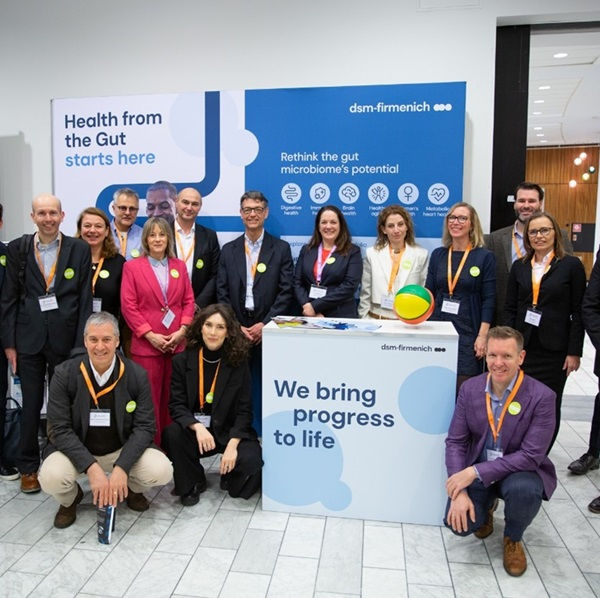News
7月 26, 2024
ACOGからのハイライト:早産リスク軽減のためのオメガ3DHA+EPAサプリメントと摂取に関する新ガイドライン
先日のACOG会議で筆頭著者が発表した、早産リスク軽減のために妊婦にオメガ3、DHA、EPAを高用量摂取させるための新たな臨床ガイドラインを紹介する。

概要
- 早産率が上昇している国もあり、妊娠前および妊娠中の女性をよりよくサポートし、健康な正期産児を出産できるようにすることが急務となっている1。
- 先ごろ開催された米国産科婦人科学会(ACOG)年次総会において、dsm-firmenich社は、早産リスク低減のための妊娠前および妊娠中のオメガ3脂肪酸摂取に関する新しい世界的な臨床実践ガイドラインにスポットを当てたセッションを開催し、ガイドラインの主執筆者が発表した。
- オメガ3のドコサヘキサエン酸(DHA)とエイコサペンタエン酸(EPA)が、特にハイリスクグループの早産リスク低減に果たす役割と、妊娠前と妊娠中の具体的なオメガ3摂取推奨量について、説得力のあるデータを紹介する。
Every year, an estimated 13 million babies worldwide are born preterm (before 37 weeks), and rates are rising in many countries like the United States (US).1,2 In the US, preterm birth is a leading cause of infant mortality, with a staggering one in ten babies born preterm.3 Moreover, the burden disproportionately impacts certain racial and ethnic groups. Non-Hispanic Black women face a 55% higher risk of preterm birth and a 115% higher risk of early preterm birth (before 34 weeks) compared to White women.4 Recent studies have shown that women with low omega-3 or DHA intakes early in pregnancy have an increased risk of preterm and early preterm birth.5,6 The financial impact of preterm birth is staggering, with estimates revealing that it cost the US $34.5 billion in healthcare costs in 2021, with almost $23 billion of that attributed to early preterm birth.7
幸いなことに、新たな臨床診療ガイドラインは、早産リスクを低減するための科学的裏付けのある有望な解決策を強調している。それは、妊娠前および妊娠中の女性に対するオメガ3脂肪酸DHAとEPAの十分な摂取である8 この出生前栄養介入の背後にある最新の科学的証拠と、母親としての旅路全体にわたるオメガ3摂取とサプリメントに関する専門家の推奨事項を探るために、以下をお読みください。
新しいオメガ3ガイドラインがACOGで注目される
Tackling the prevalence of preterm birth was a focus at this year’s ACOG Annual Clinical and Scientific Meeting in San Francisco, California, on May 17-19. With over 60,000 members, ACOG is the leading group of physicians providing obstetric and gynecologic care in the US. We had the pleasure of attending the annual meeting along with other industry experts, healthcare practitioners, scientists and patient educators. Our mission? As part of dsm-firmenich’s larger Every Day Counts campaign, we aimed to raise awareness of the new clinical practice guidelines recommending higher doses of omega-3/DHA and EPA supplements, especially for women with low baseline intakes as a solution to reduce preterm birth risk. To connect with as many delegates as possible, we participated in not one, but two booths at the meeting – one of which was hosted in collaboration with the Council for Responsible Nutrition (CRN) and five other industry partners. The CRN booth was
高用量DHAサプリメントのエビデンス
On the final day of the meeting, we hosted a Product Theatre Session spotlighting the new clinical practice guidelines for DHA (or DHA and EPA) supplementation to help reduce the risk of preterm birth, published in a leading obstetrics journal, American Journal of Obstetrics & Gynecology Maternal-Fetal Medicine (AJOC MFM), in February 2024.8 The session was moderated by Dr. Emily DeFranco (John W. Greene Endowed Professor and Chair Department of Obstetrics & Gynecology at the University of Kentucky) and the guidelines were shared by the primary authors, Dr. Susan Carlson (AJ Rice Professor of Nutrition and University Distinguished Professor, University of Kansas Medical Center) and Dr. Irene Cetin (Professor of Obstetrics and Gynecology, University of Milan Head of Obstetrics Unit, Mangiagalli). Dr. Carlson opened by highlighting that pregnant women in the US have very low intakes of fish, which is the main dietary source of omega-3
次に、カールソン博士は、妊娠中のオメガ3サプリメント摂取が早産リスクを11%、早期早産リスクを42%減少させるという質の高いエビデンスを見出した2018年のコクラン・レビューから得られた主要な知見を発表した11 カールソン博士は、妊婦に毎日200mgと1,000mgの藻類DHAを摂取させることが早産や早期早産のリスクに与える影響を比較したADORE研究から得られた知見を共有した。 全体的な解析の結果、1,000mgの摂取量は200mgの摂取量よりも優れており、早産を25%有意に減少させることが示された。 また、高用量は早期早産を29%減少させたが、統計学的には有意ではなかった5 しかし、ベースラインのDHAのステータスが低い状態で臨床試験に参加した女性では、高用量は早期早産を48%減少させるという驚くべき結果を示した5。
Moreover, her study showed that adequate intake is important even before pregnancy. Women who entered pregnancy with adequate DHA intakes (as reflected by higher blood DHA levels) were already at a substantially reduced risk of both preterm and early preterm birth. Even in mothers with high DHA blood status, further supplementation significantly reduced preterm birth, demonstrating that these mothers still need continued DHA throughout pregnancy. For mothers with low baseline DHA status, supplementing with 1,000mg DHA reduced preterm births by 26% and early preterm births by a striking 48% compared to the lower, 200mg DHA dose.5 Dr. Carlson also shared results from her study suggesting that Black women benefited most from having both an adequate baseline DHA intake and a higher dose (1,000mg) DHA supplementation.12 This data reinforces that high dose DHA, especially for women with low baseline DHA intakes, can significantly improve the chances of having a
次に、カールソン博士は、オメガ3レベルが低いために早産の危険性があり、そのために高用量のサプリメント摂取が有益である女性を、どのようにして特定できるのかという切実な疑問に取り組んだ。 カールソン博士は、有効な食物摂取頻度調査( ) 、魚、卵黄、鶏肉、レバー、およびDHA含有サプリメントの摂取に基づいて、妊娠初期の女性のDHA摂取レベルを推定することができると説明した13 この調査は、医療従事者に、患者のDHA状態を評価し、適切なサプリメントを推奨するためのツールを提供するものである。
新しい臨床DHAガイドラインは何を推奨しているのか?
セッションの後半では、イレーネ・セティン博士が、妊娠前および妊娠中のオメガ3摂取とサプリメントについて、新たに発表されたガイドラインの主な推奨事項を発表した8。
- 妊娠前の段階:妊娠初期にDHAの摂取量が少なかったり摂取量が少なかったりすると、早産のリスクが高まるため、妊娠前の段階でDHAを十分に摂取することが重要です。 ガイドラインでは、妊娠可能な年齢のすべての女性に対し、DHA単独またはEPAとの組み合わせで、1日あたり少なくとも250mgのオメガ3を定期的に摂取するようアドバイスしています。
- 妊娠中:妊娠中は、すべての女性に1日100~200mgのDHAを追加摂取することが推奨されており、DHA単独、またはEPAとDHAを合わせて少なくとも350~450mg摂取する必要がある。
- ハイリスク妊娠:妊娠初期にオメガ3またはDHAの摂取量/状態が少ないと判定された女性は、早産および早期早産のリスクが高い。 このリスクの上昇に対処するため、ガイドラインでは、DHA単独またはEPAとの併用で1日600~1,000mgの高用量を補給するよう勧めている14。
妊婦は、各段階に合わせたこれらの推奨事項に従うことで、早産のリスクを低減することが示されているオメガ3レベルに確実に到達することができる。

巨大なインパクトの可能性
The potential impact of tailored omega-3 recommendations for every woman of childbearing age could be transformative. If all pregnant women were able to supplement with an effective DHA dose, experts estimate it could help prevent over 40,000 preterm births each year in the US alone.7 What’s more, DHA no longer needs to come at a cost to marine ecosystems, as algal-oil omega-3s – such as our life’s®OMEGA – offer a more sustainable, more potent and more enjoyable to consume alternative to fish oil. Research from Frost & Sullivan estimates that supplementing all pregnant women with protective levels of algal DHA could save the US over $8 billion each year.7 With such significant benefits for mothers, babies and healthcare costs, increasing access to adequate doses of high quality DHA supplementation must be a public health priority.9
健康的な妊娠のためにオメガ3の恩恵を解き放つ
オメガ3がいかに健康な妊娠の土台作りに重要な役割を果たしているか、その詳細をご覧ください。
参考文献
1 World Health Organization, Preterm birth. Key facts. Available at: https://www.who.int/news-room/fact-sheets/detail/preterm-birth.
2 Martin JA, et al. (2023) Births in the United States, 2022. NCHS Data Brief, no 477. National Center for Health Statistics.
3 過去10年間に早産で生まれた赤ちゃんは1億5200万人 汎米保健機構、2023年6月
4 Hamilton BE, et al. (2023) Births: Provisional Data for 2022. NVSS Vital Statistics Rapid Release, Report No.28.
5 Carlsonら、Higher dose docosahexaenoic acid supplementation during pregnancy and early preterm birth: A randomized, double-blind, adaptive-design superiority trial. EClinMed 36 (2021) 100905.
6 Simmonds et al, (2020). Omega-3 fatty acid supplementation in pregnancy-baseline omega-3 status and early preterm birth: exploratory analysis of randomised controlled trial. BJOG : an international journal of obstetrics and gynaecology, 127(8), 975-981.
7 Frost& Sullivan. Supplemental algal DHAを妊産婦に提供することで、米国における早産および早期早産の経済的影響を軽減する。 Available at: Health Economics | Every Day Counts
8 Cetin、I.ら(2024)アジア太平洋保健協会(小児-新生児学ブランチ)、チャイルドヘルス財団(Stiftung Kindergesundheit)、小児科のヨーロッパアカデミー、産科と婦人科の欧州委員会& カレッジ、新生児のケアのためのヨーロッパ財団、小児科研究のためのヨーロッパ学会、健康と病気の発達の起源のための国際学会を代表して臨床実践ガイドライン。 早産や早産早産のリスク低減のための妊娠中のオメガ3脂肪酸の供給。 産科のアメリカジャーナル& 婦人科MFM、6(2)、101251。
9 Regan L. Bailey, PhD, MPH, RD; Susan G. Pac, MS, RD; Victor L. Fulgoni III, PhD; Kathleen C. Reidy, DrPH, RD; Patrick M. Catalano, MD. Estimation of Total Usual Dietary Intakes of Pregnant Women in the United State. JAMA Network Open. 2019;2(6).
10 Zhang Z, Fulgoni VL, Kris-Etherton PM, Mitmesser SH. Dietary Intakes of EPA and DHA Omega-3 Fatty Acids among US Childbearing-Age and Pregnant Women: An Analysis of NHANES 2001-2014. Nutrients. 2018;10(4):416. Published 2018年3月28日。
11 Middleton et al., Omega-3 fatty acid supplementation during pregnancy, Cochrane Review 2018.
12 DeFranco EA, Valentine CJ, Carlson SE, Sands SA, Gajewski BJ. Racial disparity in efficacy of docosahexaenoic acid supplementation for prevention of preterm birth: secondary analysis from a randomized, double-blind trial.
13 Christifano DN, Crawford SA, Lee G, Gajewski BJ, Carlson SE. (2022) 7- question online screener for DHA intakeの有用性 Prostaglandins Leukot Essent Fatty Acids;177:102399.
14 Cetin I, Carlson SE, Burden C, et al. 早産・早期早産のリスク軽減のための妊娠中のオメガ3脂肪酸供給 Am J Obstet Gynecol MFM 2024;6:101251.
関連コンテンツ
すぐにアクセスできるリンク
機能性成分をカスタマイズ配合した、効率的なプレミックス製品。
製品開発プロセスを合理化し、より早く市場に投入しましょう。
展示会から会議、その他の業界イベントまで、次はどこで当社に会えるか確認してください。
最新の記事で、新しい科学、消費者動向、業界ニュースなどをお楽しみください。
教育に関するホワイトペーパー、ウェビナー、出版物、技術情報をご覧ください。
サンプル請求、注文、製品資料の閲覧。


